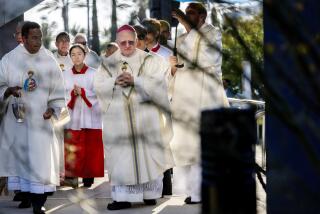Bishop Tells Catholics to Skip ‘Temptation’
- Share via
Bishop Norman F. McFarland of the Diocese of Orange acknowledged Tuesday that he feels “in a corner” in commenting on “The Last Temptation of Christ,” a film he hasn’t yet seen.
But based on press accounts and the report of Bishop Anthony Bosco of Greensburg, Pa., who watched a rough cut of the film, McFarland said he had several objections to the Universal Pictures release. As a result, he is asking the county’s half-million Roman Catholics to exercise “intelligence” and “good sense” and avoid the film.
Directed by Martin Scorsese and based on the 1955 novel by Nikos Kazantzakis, the film includes a dying Jesus, hallucinating a family life--including sexual relations--with Mary Magdalene as his wife.
In addition to this sequence, McFarland said he was offended by reports that Jesus questions his own sinfulness and that he is “an indecisive, wimpish type of person--not the character of the Scriptures that we know.”
On Sunday, a one-page letter from McFarland on the movie will be read from the pulpits of the diocese’s churches.
It will not be the first time the bishop has involved himself in a dispute over the performing arts in a secular setting.
While bishop of the Diocese of Nevada, McFarland protested a college production of “Sister Mary Ignatius Explains It All to You,” a one-woman play satirizing Catholic education.
His stronger reaction to plays and films, as opposed to books and articles, McFarland said, may be because of “the wider impact, the appeal to the emotions” of the performing arts.
McFarland said it is difficult to define what should be the precise limits in fictionalizing the life of Jesus, pointing to accounts of Jesus’ early life in some of the apocryphal Gospels of the 1st Century. Some of these “nice little stories” were clearly fictional, he said, although they were “well-meaning attempts to motivate others to get interested in Christ.”
‘Compatible With the Truth’
The key test, McFarland said, is “whatever you do, make it ring true to the character that we know, compatible with the truth that we know about Jesus. . . . There’s a certain manner of dealing with sacred things.”
The bishop said that if a vision of a complete family life for Jesus, including conjugal relations, had been placed in the context of the temptation on the mountaintop, as recounted in the Bible, rather than as part of a final vision during the Crucifixion, as in the film, his objections would be different.
“Intellectually,” he said, such a portrayal “is not contrary to truth, although it might be contrary to decency. . . . Theologically, I don’t see anything wrong with that, but I wouldn’t want it portrayed.”
More to Read
Only good movies
Get the Indie Focus newsletter, Mark Olsen's weekly guide to the world of cinema.
You may occasionally receive promotional content from the Los Angeles Times.










